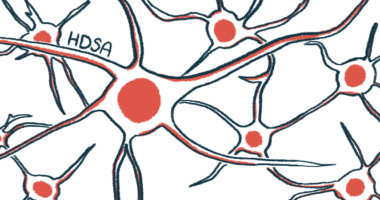First Patients Enrolled in PROOF-HD Phase 3 Trial Testing Pridopidine

The first U.S. patients have been enrolled in PROOF-HD, a Phase 3 clinical trial investigating pridopidine as a treatment for Huntington’s disease, according to developers Prilenia Therapeutics.
PROOF-HD (NCT04556656) will enroll up to 480 people with early-stage Huntington’s, and is currently recruiting at more than 60 sites across the U.S. and Europe. More information can be found here and here.
“Huntington’s Disease is a serious condition with no known treatments that slow functional decline,” Andrew Feigin, MD, North American principal investigator for the PROOF-HD Phase 3 trial, said in a press release.
“A successful result would be a major advance in our ability to treat HD,” said Feigin, chair of the Huntington Study Group, which is collaborating on the trial. “I look forward to working with the Prilenia team as we push forward with patient recruitment.”
A progressive, neurological disorder, Huntington’s is caused by a mutation to the huntingtin (HTT) gene, which causes the degeneration and death of brain cells.
Pridopidine is a small molecule that is designed to activate the sigma-1 receptor (S1R), a protein expressed at high levels in brain cells. By activating S1R, pridopidine increases the production of brain-derived neurotrophic factor, a protein with neuroprotective effects, whose levels are reduced in Huntington’s patients.
Pre-clinical research has shown that S1R activation can counteract cell death caused by mutant huntingtin. Furthermore, studies have shown that pridopidine treatment improves behavioral and motor function in mouse models of Huntington’s.
The PROOF-HD study — formally known as PRidopidine’s Outcome On Function in Huntington Disease — builds on previously completed clinical studies with data totaling more than 1,000 patient-years. Patient-years, a multiplication of the number of patients by the number of years of treatment, is a useful measure for researchers.
The results to date have established that pridopidine has a favorable safety profile, is well-tolerated, and shows evidence of efficacy in patients with early stage disease.
A recently completed Phase 2 trial (NCT02006472), called PRIDE-HD, showed that one year of treatment with pridopidine (45 mg given twice a day) significantly prevented functional decline in people with early stage Huntington’s.
Results from a Phase 2 long-term extension study, called OPEN-HART (NCT01306929), also supported these benefits.
The PROOF-HD study will now evaluate whether pridopidine has a potential long-term clinical benefit for people with early stage Huntington’s.
To enroll, participants must be age 25 or older, and have a confirmed diagnosis of early stage, adult-onset Huntington’s disease.
During the trial, the patients will be randomly selected to receive either an oral capsule of 45 mg pridopidine, taken twice daily, or a placebo, used for comparison. With the medication given irrespective of meals, the participants are intended to take one capsule in the morning and one in the afternoon, seven to 10 hours later.
This treatment portion of the study will last for 65 to 78 weeks, or 15 to 18 months, with an optional open-label extension phase — in which all participants will be given pridopidine — for patients wishing to continue treatment thereafter.
The study’s primary goal is to measure the efficacy of the treatment, using the Unified Huntington’s Disease Rating Scale–Total Functional Capacity (UHDRS-TCF) to monitor the patients’ functional abilities. Measurements will be taken at the start of the trial (baseline) and subsequently at 65 weeks to see how functional capacity changes over time. The researchers will compare the abilities of the pridopidine and the placebo groups.
“The design of the PROOF-HD study is based on strong scientific and clinical data, including in vivo [in the body] target engagement for the selected dose, prior clinical efficacy results and extensive long-term safety data in our target population,” said Michael R. Hayden, CEO of Prilenia and a Huntington’s disease research scientist.
“Enrolling our first patients is a significant milestone that brings hope to others” with Huntington’s, he said.
Successful results from the PROOF-HD study could lead to the official registration of pridopidine as a treatment for Huntington’s disease, according to Prilenia.
The trial is being conducted by Prilenia and the Huntington Study Group, a non-profit organization that facilitates research trials for Huntington’s disease.






